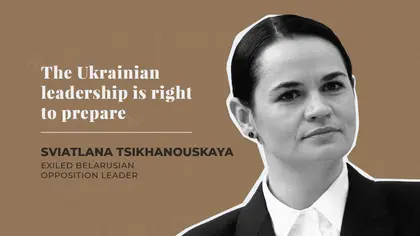Her comments come amid growing concerns over Russian President Vladimir Putin’s trip to Belarus, with the increasingly isolated leader scheduled to meet Belarusian President Alexander Lukashenka in Minsk today, Monday Dec. 19.
The trip, which is expected to first see ministers from the two allied nations meet to discuss their future relationship, and conclude with a one-on-one meeting between Lukashenka and Putin, followed by an eagerly awaited press conference.
Both parties have officially stated they will discuss "the process of implementing previously adopted allied programs," with Lukashenka telling reporters in Minsk on Friday, Dec. 16, that the situation regarding Ukraine was "escalating".
This has been seen by some, including the Institute for the Study of War, as a sign that Belarus could be joining Russia in launching a new offensive in Ukraine in the coming weeks or months.
Tsikhanouskaya staunchly insists that her people oppose Belarus’ participation in the war, but admits that Ukraine is "right to prepare" because the probability "might increase in coming weeks."
"Belarusian armed forces are part of the society and share the same view on the war – 86 percent of Belarusians are against participation in the war," she told Kyiv Post. "This has stopped the order to send Belarusian troops to the battlefield in Ukraine. It was not a good will of dictators or Lukashenka's standing up to Putin - he is fully on the Kremlin's side.

EU Transfers €1.5 Bln Raised From Russian Assets for Ukraine
"However, the probability of such an order remains and might increase in coming weeks. I think the Ukrainian leadership is right to prepare for this scenario even though it means distracting significant forces from active war zones in the south-east.”
Tsikhanouskaya said that Lukashenka “sees Ukraine as a threat,” adding that “a democratic, free, European Ukraine is a bad example to the dictatorships of Lukashenka and Putin, therefore this war is a logical decision for them.”
When asked what Russia and Belarus’ joint aim might be, the outspoken exiled Politician was clear in her answer: “to destroy Ukraine, its European aspirations and national identity, and bring it under their control.”
“The [Lukashenka] regime is insecure and cannot re-establish control over the country,” she continued. “It has become completely detached from the people and acts with the sole goal to preserve Lukashenka's power, even if it means yielding sovereignty to Russians.
“There are thousands of political prisoners - the highest rate per capita in the world. In addition to repressions because of the internal crisis, scores of Belarusians are persecuted because they support Ukraine in the war.”
In October, Belarus deployed thousands of troops to conduct joint military drills with Russia, further stoking fears that Lukashenka was preparing to send his troops into Ukraine.
“The war started because Lukashenka allowed Russia to use our territory to attack Ukraine [in February],” Tsikhanouskaya said. “It was an illegal decision that violated the Constitution and went against the will of the people.”
“This could be the answer on how to end the war - by removing Belarus out of the war, including by complete and full withdrawal of the Russian troops from Belarusian territory.
“Before this happens, the world needs to continue to strengthen Ukraine's ability to defend itself and provide basic services to people,” she added. “And of course, the world must know about the events in Ukraine - it is not the moment for fatigue, it is the time to stay focused and not let the aggressors get away with the crimes.”
Concerns are already growing over Russia potentially launching a new ground offensive early next year, with Ukrainian Defense Minister Oleksii Reznikov speculating that such an offensive could take place in February. "The second part of the mobilization, 150,000 [soldiers] approximately… do a minimum of three months [training] to prepare," Reznikov told The Guardian newspaper on Dec. 15.
"It means they are trying to start the next wave of the offensive probably in February… That’s their plan," he underlined.
You can also highlight the text and press Ctrl + Enter






